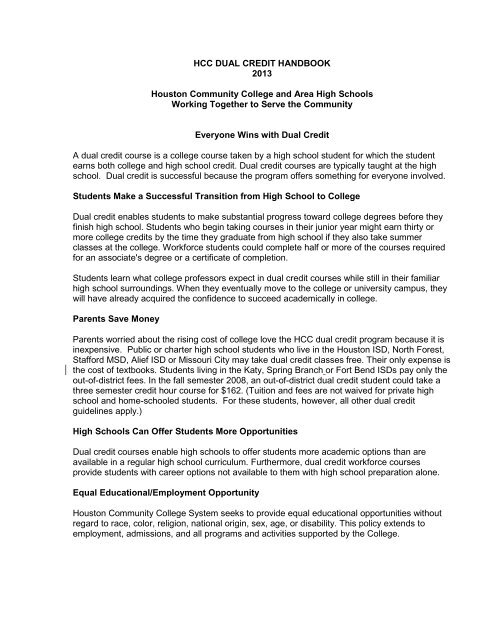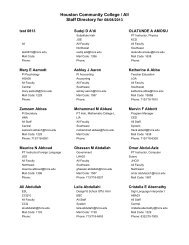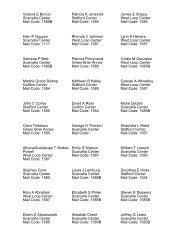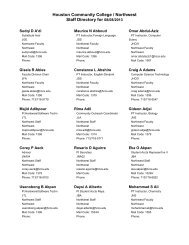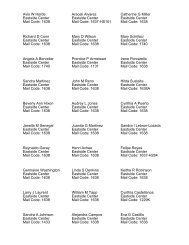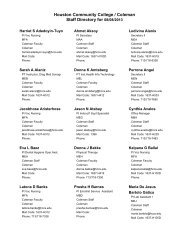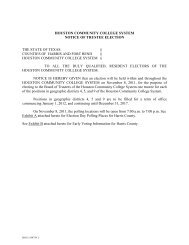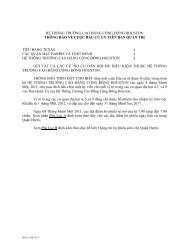Dual Credit Handbook - Houston Community College System
Dual Credit Handbook - Houston Community College System
Dual Credit Handbook - Houston Community College System
Create successful ePaper yourself
Turn your PDF publications into a flip-book with our unique Google optimized e-Paper software.
HCC DUAL CREDIT HANDBOOK<br />
2013<br />
<strong>Houston</strong> <strong>Community</strong> <strong>College</strong> and Area High Schools<br />
Working Together to Serve the <strong>Community</strong><br />
Everyone Wins with <strong>Dual</strong> <strong>Credit</strong><br />
A dual credit course is a college course taken by a high school student for which the student<br />
earns both college and high school credit. <strong>Dual</strong> credit courses are typically taught at the high<br />
school. <strong>Dual</strong> credit is successful because the program offers something for everyone involved.<br />
Students Make a Successful Transition from High School to <strong>College</strong><br />
<strong>Dual</strong> credit enables students to make substantial progress toward college degrees before they<br />
finish high school. Students who begin taking courses in their junior year might earn thirty or<br />
more college credits by the time they graduate from high school if they also take summer<br />
classes at the college. Workforce students could complete half or more of the courses required<br />
for an associate's degree or a certificate of completion.<br />
Students learn what college professors expect in dual credit courses while still in their familiar<br />
high school surroundings. When they eventually move to the college or university campus, they<br />
will have already acquired the confidence to succeed academically in college.<br />
Parents Save Money<br />
Parents worried about the rising cost of college love the HCC dual credit program because it is<br />
inexpensive. Public or charter high school students who live in the <strong>Houston</strong> ISD, North Forest,<br />
Stafford MSD, Alief ISD or Missouri City may take dual credit classes free. Their only expense is<br />
the cost of textbooks. Students living in the Katy, Spring Branch or Fort Bend ISDs pay only the<br />
out-of-district fees. In the fall semester 2008, an out-of-district dual credit student could take a<br />
three semester credit hour course for $162. (Tuition and fees are not waived for private high<br />
school and home-schooled students. For these students, however, all other dual credit<br />
guidelines apply.)<br />
High Schools Can Offer Students More Opportunities<br />
<strong>Dual</strong> credit courses enable high schools to offer students more academic options than are<br />
available in a regular high school curriculum. Furthermore, dual credit workforce courses<br />
provide students with career options not available to them with high school preparation alone.<br />
Equal Educational/Employment Opportunity<br />
<strong>Houston</strong> <strong>Community</strong> <strong>College</strong> <strong>System</strong> seeks to provide equal educational opportunities without<br />
regard to race, color, religion, national origin, sex, age, or disability. This policy extends to<br />
employment, admissions, and all programs and activities supported by the <strong>College</strong>.
<strong>College</strong> Contacts<br />
HCC is a large system with regional colleges located across <strong>Houston</strong>. Each of the regional<br />
colleges (Central, Northeast, Northwest, Southeast, and Southwest) has more than one campus<br />
at which we teach classes and offer students a variety of services. <strong>Dual</strong> credit courses are<br />
organized by the regional colleges in partnership with high schools. The HCC chancellor and<br />
the high school superintendents sign partnership agreements specifying the basic terms of the<br />
partnership. (See Appendix A for a copy of the complete partnership agreement.)<br />
If you are a high school student, parent, or staff member (faculty, counselor, principal, etc.) and<br />
wish to know how to organize a dual credit course, enroll in one, or teach one, please contact<br />
an appropriate contact at your closest HCC regional college.<br />
HCC-Central <strong>College</strong> works with the following HISD high schools – HSPVA, Jones, Lamar,<br />
Madison, Sterling, Worthing, and Yates. For HCC information, contact either:<br />
Dr. Cheryl Peters or Dr. Genevieve Stevens<br />
Executive Dean Instr & Stu Svcs Interim Dean of Instruction<br />
713-718-6081 713-718-6215<br />
Cheryl.Peters@hccs.edu Genevieve.Stevens@hccs.edu<br />
HCC-Northeast <strong>College</strong> works with North Forest ISD and the following HISD high schools –<br />
Davis, Furr, Sam <strong>Houston</strong>, Barbara Jordan, Kashmere, Reagan, Scarborough, Walthrip,<br />
Washington, and Wheatley. For HCC information, contact either:<br />
Dr. Doretha Eason or Dr. Ronald Dewlen<br />
Executive Dean Instr & Stu Svcs Dean of Academics<br />
713-718-8056 713-718-8315<br />
Doretha.Eason@hccs.edu Ronald.Dewlen@hccs.edu<br />
HCC-Northwest <strong>College</strong> works with Katy and Spring Branch ISD schools and HISD Westside<br />
HS. For HCC information, contact either:<br />
Dr. Edmund “Butch” Herod or Mary Alice Wills<br />
Executive Dean Instr & Stu Svcs P-16 Liaison<br />
713-718-5724 713-718-5716<br />
Butch.Herod@hccs.edu Maryalice.Wills@hccs.edu<br />
HCC-Southeast works with the following HISD schools – Austin, Chavez, Eastwood, Milby, and<br />
the Sanchez Charter HSD. For HCC information, contact either:<br />
Dr. Pauline Warren or Dr. William “Bill” Tapp<br />
Dean of Academic Dev Interim Dean of Workforce Development<br />
713-718-7065 713-718-7500<br />
Pauline.Warren@hccs.edu William.Tapp@hccs.edu<br />
HCC-Southwest works with the Alief, Fort Bend, and Stafford school districts, and the following<br />
HISD schools – Bellaire, Lee, Sharpstown, and Westbury. For HCC information, contact either:<br />
Betty Fortune or Dr. Arnold Goldberg<br />
Interim Academic Dean Dean of Workforce Development<br />
713-718-7743 713-718-7913<br />
Betty.Fortune@hccs.edu Arnold.Goldberg@hccs.edu<br />
2
HCC-District Office Contacts<br />
Dr. Freddie Wade III, Director of Workforce Program Initiatives 713-718-7596 Freddie.Wade@hccs.edu<br />
Dr. Maria Straus, Director of Instructional Initiatives 713-718-5192 Maria.Straus@hccs.edu<br />
Course Offerings<br />
In theory, any course taught by HCC could be taught for dual credit as long as students have<br />
the prerequisite skills and abilities. HCC offers courses and programs in over 30 academic<br />
subject areas and over 70 workforce areas. For a complete list of HCC courses and programs,<br />
refer to the college catalog, available on-line at http://www.hccs.edu/catalog/hom.html.<br />
Academic Courses<br />
Academic courses are those that are typically required for students who intend to transfer from<br />
HCC and pursue a traditional baccalaureate (four-year) degree at a university. The most<br />
popular academic courses are American History, English Composition, American Government,<br />
Economics, Psychology, Sociology, and Spanish. All of these courses satisfy core curriculum<br />
requirements at HCC and will transfer to any public college or university in the state of Texas as<br />
core curriculum. <strong>College</strong> algebra, art history, speech, introductory biology, and introductory<br />
chemistry may also be taught as dual credit and would transfer as core curriculum. Science lab<br />
courses can only be taught as dual credit when the high school lab meets the requirements of<br />
the college curriculum. Sometimes it is possible for the high school students to take a dual credit<br />
science course in a college lab at one of our campuses.<br />
Career and Technical Education Courses<br />
Career and Technical Education courses are those courses intended primarily to prepare<br />
students with entry-level job skills. Many of them, however, will also transfer to four-year<br />
degrees. HCC has a number of strong career and technical educational courses that could be<br />
offered as dual credit, including courses in the career cluster areas such as (1) Agriculture,<br />
Food & Natural Resources, (2) Architecture & Construction, (3) Arts, A/V Technology<br />
&Communications, (4) Business, Management & Administration, (5) Education & Training,<br />
(6) Finance, (7) Government & Public Administration, (8) Health Science, (9) Hospitality &<br />
Tourism, (10)Human Services, (11) Information Technology, (12) Law, Public Safety,<br />
Corrections & Security, (13) Manufacturing, (14) Marketing, Sales & Service, (15) Science,<br />
Technology, Engineering & Mathematics, and (16) Transportation, Distribution & Logistics.<br />
<strong>College</strong> Prep Courses<br />
HCC may also offer college prep classes in reading, writing, mathematics, student success, and<br />
ESL for those students who have not attained college-level skills. We must charge standard<br />
tuition rates for all but the “exit level” courses in these areas. <strong>College</strong> prep courses are not<br />
transferable for college credit. The purpose of college prep courses is to prepare students for<br />
college-level work. High schools could also award appropriate high school credit for the<br />
courses.<br />
<strong>College</strong> prep classes might be most appropriate in mathematics. Many high school graduates<br />
do not have college-level mathematics skills. <strong>College</strong> prep mathematics classes could enable<br />
3
high school students to strengthen their math skills so they will be prepared to take college<br />
algebra when they become full-time college students.<br />
HCC also offers a Student Success Course (GUST 1270) that allows those students who are<br />
undecided about their future to explore a variety of career options while honing their college<br />
study skills.<br />
Student Eligibility<br />
All dual credit students, regardless of whether they intend to take academic, workforce, or<br />
college prep courses, must satisfy the following criteria:<br />
• Junior or senior standing in high school;<br />
• Passing TAAS or TAKS scores; and/or<br />
• Appropriate scores on HCC placement tests (ASSET or COMPASS)<br />
The six regional HCC colleges will work with high schools in their areas to arrange for the<br />
testing of students as needed. (For a complete explanation of assessment requirements for<br />
students to take HCC <strong>Dual</strong> <strong>Credit</strong> courses, please refer to Appendix B.)<br />
Applying for Admission to <strong>Houston</strong> <strong>Community</strong> <strong>College</strong><br />
To apply for admission to HCC, students must complete an HCC application. This may be<br />
accomplished on line at the HCC web site: http://www.hccs.edu. Click on "For Students" and<br />
then "Application." Select "Semester <strong>Credit</strong> Hour" (SCH) when completing the application.<br />
Students will need the following information in order to complete the application:<br />
• Social Security Number<br />
• Visa/Permanent Resident Information (if applicable)<br />
• Texas Driver's License<br />
• Social Security Number of Parent/Guardian (if residency claimed upon<br />
Parent/Guardian).<br />
• Permanent Resident Information of Parent/Guardian (if residency claimed upon<br />
Parent/Guardian.).<br />
• THEA scores (if applicable).<br />
• SAT, ACT, and/or TAAS or TAKS Scores and Test Dates (if applicable)<br />
• ASSET or COMPASS scores (if applicable)<br />
• Dates of high school attendance<br />
Select "High School Concurrent" under Admit Type.<br />
For admissions assistance, including the PRIS (Pre-Registration Information Session), contact<br />
your regional college representative.<br />
Registration and Payment<br />
Once students have completed the admissions process, they can then register for the classes<br />
they wish to take using the course name, course number, and class number for the classes they<br />
wish to take. For example, English 1301 is the course name and number for English<br />
4
Composition I. Each course section has a unique five-digit course number. High school<br />
counselors will be given the course numbers for the dual credit courses at their sites.<br />
HCC colleges will work with the high schools to provide registration information. Students will be<br />
expected to pay out-of-district fees (if applicable) at the time of registration.<br />
Public and charter school students living in-district (<strong>Houston</strong> ISD, Stafford MSD, Alief ISD and<br />
Missouri City residents) may take dual credit classes tuition-free. Students living out-of-district<br />
pay only the out-of-district fees. Private high school and home-schooled students pay regular<br />
HCC tuition and fees, which vary depending on whether the student lives in- or out-of-district.<br />
Not every class taken for dual credit qualifies for the tuition and fee waiver. <strong>Dual</strong> credit courses<br />
taught at the high school campus during the school day qualify for the waiver. We can also<br />
waive tuition and fees for special course sections taken by a group of high school students on<br />
an HCC Campus. These will be arranged in certain subjects and at certain times (as during the<br />
summer) between the HCC colleges and the partner high schools. In general, however,<br />
regularly scheduled college courses at an HCC campus do not qualify for the waiver.<br />
Faculty<br />
<strong>Dual</strong> credit classes may be taught by either HCC faculty members or by current high school<br />
instructors, depending on whether available high school instructors hold appropriate credentials<br />
to teach college courses.<br />
Academic Faculty: Faculty members teaching college transfer courses such as history and<br />
English composition must hold a master's degree with at least eighteen graduate hours in the<br />
teaching field. For example, a high school instructor with a master's degree in history is<br />
qualified to teach History 1301 for the college. An instructor with a master's degree in education<br />
is qualified as well if she also has at least eighteen graduate hours in history.<br />
Workforce Faculty: Faculty members teaching workforce courses must hold at least an<br />
associate's degree and have a minimum of three year's work experience in the field. An<br />
accounting instructor, for example, must have at least three year's experience working as an<br />
accountant. Experience teaching accounting does not count toward the three years required<br />
employment experience.<br />
<strong>College</strong> Prep Faculty: Faculty members teaching college prep courses must hold a bachelor's<br />
degree in a related field to the subject they are teaching and have some teaching experience. A<br />
high school math teacher, for example, would likely be qualified to teach college prep math for<br />
the college.<br />
Employment<br />
<strong>Dual</strong> credit instructors are employees of <strong>Houston</strong> <strong>Community</strong> <strong>College</strong>, regardless of whether<br />
they are also on the faculty of the high school. High school instructors teaching dual credit<br />
courses must complete an HCC job application, supply the college with official university<br />
transcripts, attend HCC faculty orientations, and work with their HCC faculty department chair<br />
on all instructional issues related to the college course. In turn, the college will compensate the<br />
instructor at the standard rate for HCC adjunct faculty. For further assistance, prospective dual<br />
credit instructors should work with their regional college contacts.<br />
5
Working with <strong>College</strong> Faculty at the High Schools<br />
When the college assigns its regular faculty members to teach a dual credit course on the high<br />
school campus, the high school administration should work with the college to ensure a<br />
successful semester. The college instructor will need information concerning parking,<br />
restrooms, mail service, photocopy facilities, lab, and audio-visual equipment. The instructor<br />
should be given the name of a college liaison and a telephone number to call in case of an<br />
emergency.<br />
Complaints<br />
Sometimes students have complaints about their instructors. Students who voice complaints to<br />
high school counselors should be encouraged to attempt to resolve the matter with their college<br />
instructor. If the student is uncomfortable speaking with the instructor or is dissatisfied with the<br />
result of the conversation, the student should be directed to the appropriate dean (listed in the<br />
college contacts).<br />
Parents are concerned about the educational progress of their children and sometimes want to<br />
discuss student complaints or other issues with an instructor, a department chair, or a dean. In<br />
general, college faculty members, chairs and deans are uncomfortable speaking with parents<br />
about student-related issues unless the student is also present. If a parent believes that a<br />
private conference is necessary, the parent should work through the college deans to arrange<br />
the conference.<br />
Course Curricula and Grading<br />
A dual credit course is a college course in all respects. The curriculum is the curriculum for the<br />
college course. The textbooks are the same books used on the college campus and the grading<br />
standard is the same.<br />
High school administrators sometimes want to enrich the college course. They may want to<br />
include course materials that are part of the high school curriculum that are not stressed in the<br />
college course or to add materials to satisfy Advanced Placement (AP) course requirements.<br />
This goal can best be accomplished by adding hours to the college course and assigning a high<br />
school instructor to enrich the curriculum. Because of the length of high school periods and the<br />
length of the high school semesters, more class time is usually available than is needed for the<br />
college course. NOTE: <strong>College</strong>s expect students to spend at least as much (if not twice as<br />
much) time out-of-class as in-class in reading, studying, and preparation for college course<br />
assignments. This is true for dual credit courses as well, since they are college courses.<br />
The college instructor will assign grades on the standard HCC grading scale:<br />
• 90-100 percent is a grade of A<br />
• 80-89 percent is a B<br />
• 70-79 percent is a C<br />
• 60-69 percent is a D<br />
• less than 60 percent is an F.<br />
6
<strong>College</strong> students have the option of withdrawing from the class and may be administratively<br />
withdrawn by their instructor if they have excessive absences.<br />
<strong>College</strong> instructors will work with the high school administration to provide periodic grade<br />
reports for school records. The rules of dual credit allow college faculty to use two grading<br />
scales, one for the high school class and the other for the college class. Consequently, a<br />
student could master the course material at a level satisfactory to pass the high school class<br />
while failing the college course.<br />
HCC Library Resources for <strong>Dual</strong> <strong>Credit</strong> Students<br />
As registered HCC students, dual credit students are entitled to full use of the resources and<br />
services of any HCC library. Regardless of which college a student is enrolled in, the resources<br />
of any HCC library are available to him or her. Resources and services include access to the<br />
HCC print collections, periodicals, reference materials and electronic resources, as well as<br />
instruction in the use of these materials and general reference assistance.<br />
While most of the research needs of dual credit students may be met by the resources of the<br />
high school library, it is important to inform students that they may access the full resources of<br />
the HCC system as well. The college's electronic resources include a broad range of full text<br />
databases. These databases are accessible through any HCC Library or they may be accessed<br />
from home computers with appropriate authorization.<br />
In order for students to use HCC resources or access electronic databases, they must have an<br />
HCC Library Card, which may be obtained from any HCC Library. The student will need to<br />
present a fee receipt for the current semester and a photo ID, either a Texas driver's license or<br />
an ID from the Texas Department of Public Safety.<br />
Finally, HCC is an institution of higher education. The HCC Libraries provide materials that<br />
support and supplement the educational process. No effort is made to either censor or filter any<br />
materials from its collections.<br />
HCC Student Services for <strong>Dual</strong> <strong>Credit</strong> Students<br />
The HCC Student Development Departments provide a wide range of services designed to<br />
supplement the student’s total college experience at <strong>Houston</strong> <strong>Community</strong> <strong>College</strong>. The<br />
departments serve as a vehicle for increased access to both career & technical education<br />
programs and academic programs, as well as to the community at large. <strong>Dual</strong> credit students<br />
are encouraged to make use of the services offered to all registered HCC students, including<br />
access to both academic and personal counseling, career exploration, financial aid, testing, and<br />
job placement activities. Student organizations and activities are also available and dual credit<br />
students are encouraged to take part in these as possible and appropriate.<br />
An Open Letter to <strong>Dual</strong> <strong>Credit</strong> Students<br />
Welcome to <strong>Houston</strong> <strong>Community</strong> <strong>College</strong>! We are delighted that you have chosen to get a<br />
jump-start on your college education by participating in the HCC dual credit program.<br />
7
<strong>College</strong> courses are both interesting and challenging. You will learn a great deal, but you will be<br />
expected to work hard. On average, college students should plan to study at least two hours a<br />
week for every hour spent in the classroom. Students taking a three-semester hour class should<br />
set aside a minimum of six hours a week to study. Some students will need to study more. Most<br />
students should schedule extra study time when exams are planned or course projects are due.<br />
Pay careful attention to your instructor's system for assigning grades. If you do poorly on a test<br />
or assignment, most college instructors will not allow you to repeat the work in order to improve<br />
your grade. You should not expect to receive extra course credit for attendance. Also, your<br />
instructor will probably not allow you to do extra work to bring up a poor grade.<br />
The grade you earn in this course will become part of your permanent college record. We all<br />
hope that your grade is a good one, but if you find yourself doing poorly in the<br />
class, you may wish to drop. Students who withdraw before the official drop date will receive a<br />
W on their transcript. A withdrawal is preferable to a grade of D or F. If you<br />
need to drop, be sure that you complete the appropriate paperwork and do so before the last<br />
date for course withdrawal.<br />
<strong>College</strong> courses sometimes deal with controversial issues or subject matter that high school<br />
courses would ordinarily avoid. Your instructor will teach the same course he or she teaches on<br />
our college campus.<br />
Be sure that you understand your instructor's attendance policy. <strong>Houston</strong> <strong>Community</strong> <strong>College</strong><br />
policy states that students may be dropped if they miss more than six hours<br />
of class in a three semester-hour course. In contrast to high school, the college does not<br />
distinguish between excused and unexcused absences. If you miss class because you are ill or<br />
attend a school function, those absences will count against you. Your instructor may also have a<br />
tardy policy.<br />
Don't Be Afraid to Ask Questions - Your instructor is available to answer questions about course<br />
materials or class policies. If you have any concerns about your performance in the course or<br />
you are not sure whether you understand an assignment, please do not hesitate to schedule a<br />
conference with your instructor. All of us at <strong>Houston</strong> <strong>Community</strong> <strong>College</strong> are dedicated to<br />
helping you achieve your goals. Don't be afraid to ask questions!<br />
We wish you the best for an excellent semester. We are sure that you will not only learn a great<br />
deal, but that you will enjoy your courses as well. If you have questions about the<br />
college that we can answer, please call us or email us. We always enjoy speaking with<br />
students.<br />
Sincerely,<br />
Charles M. Cook, Ed.D.<br />
Vice Chancellor for Educational Development<br />
713-718-5040<br />
Charles.Cook@hccs.edu<br />
Freddie Wade, Ed.D.<br />
Director, Career and Technical Education Initiatives (career & tech educ dual credit courses)<br />
8
713-718-7596<br />
Freddie.Wade@hccs.edu<br />
Maria Straus, Ed.D.<br />
Director, <strong>College</strong> Learning Initiatives (academic dual credit courses)<br />
713-718-5192<br />
Maria.Straus@hccs.edu<br />
9
Appendix A: HOUSTON COMMUNITY COLLEGE SYSTEM<br />
Partnership Agreement with Participating School Districts, Charter or Private Schools<br />
For <strong>Dual</strong> <strong>Credit</strong> Courses<br />
The intent of this agreement is to allow <strong>Houston</strong> <strong>Community</strong> <strong>College</strong> (HCC) to partner with new<br />
school districts, Charter Schools and Private Schools and to update prior agreements with<br />
current partner school districts in offering dual credit courses. (*<strong>Dual</strong> credit is sometimes<br />
referred to as concurrent course credit; the terms are equivalent.)<br />
A. <strong>Dual</strong> <strong>Credit</strong> versus other types of instructional partnerships (for high school credit only,<br />
Tech-Prep credit, or developmental courses). To distinguish dual credit from other types of<br />
instructional partnerships allowable for HCC and partner school districts, the following<br />
explanations are offered.<br />
1. Partnerships for award of high school credit only. This type of partnership requires a<br />
separate contractual agreement between a public school district and HCCS for the latter<br />
to provide instruction in courses to high school students for award of high school credit<br />
only. These courses are not eligible to the college for state formula funding.<br />
2. Partnerships for award of dual (concurrent course) credit. This type of partnership<br />
between a public school district and HCC allows for the college to provide instruction to<br />
high school students for immediate award of both high school credit and college<br />
certificate and associate degree credit. Elements of this type of partnership are detailed<br />
in Section B below. State funding for dual credit courses is available to both public<br />
school districts and colleges based on the current funding rules of the State Board of<br />
Education and the Coordinating Board. A partnership for award of dual credit may be<br />
created by approval of this agreement by the governing boards or designated authorities<br />
of both the public school district or private secondary school and HCC. Signature lines<br />
and dates are provided at the end of the agreement.<br />
3. Partnerships for Tech-Prep Programs. This type of partnership between a public school<br />
district and HCC allows for the articulation of high school technical courses taught by the<br />
high school to high school students for immediate high school credit and later college<br />
credit, to be awarded upon enrollment of the students in HCC associate degree or<br />
certificate programs. These courses are not eligible to the college for state formula<br />
funding.<br />
4. Partnerships for developmental instruction for high school students. This type of<br />
partnership between a public school district and HCC allows for the college to provide<br />
instruction to high school students in developmental courses to prepare students for<br />
college-level work. This type of instruction is available to both the public school district<br />
and HCCS for state funding, but may not be considered dual credit because it results in<br />
no college-level credit.<br />
B. Required Elements of Partnership Agreement for <strong>Dual</strong> <strong>Credit</strong> Courses<br />
1. Student Eligibility Requirements<br />
a. To be eligible for enrollment in a dual credit course in a college level one certificate<br />
program (42 semester credit hours or less), the high school student must have<br />
passed all sections of the exit-level TAKS test or meet one of the criteria below.<br />
10
. To be eligible for enrollment in a dual credit course for which college readiness is<br />
required and courses in level two certificate and associate degree programs, the high<br />
school student must present a passing score on ASSET or COMPASS (or other<br />
Coordinating Board-approved assessment instruments such as the ACT, SAT,<br />
THEA, etc.) in the area or areas (reading, writing, and/or math) as deemed<br />
applicable by the college for the intended course.<br />
c. A student who has received an exemption from taking the TAKS tests may qualify to<br />
enroll in a dual credit course by meeting criterion (b) above.<br />
d Students who are enrolled in private, charter or non-accredited secondary schools<br />
or who are home-schooled must satisfy criteria (b) above.<br />
e. To be eligible for enrollment in a dual credit course, students must meet all the<br />
college’s regular prerequisite requirements designated for that course.<br />
f. To be eligible for enrollment in a dual credit course, a student must be at least a<br />
junior in high school. Exceptions to this requirement for students with demonstrated<br />
outstanding academic performance and capability (as evidenced by GPA, PSAT<br />
scores, or other assessment indicators) may be approved by the principal of the high<br />
school and the relevant college instructional dean.<br />
g. High school students shall not be enrolled in more than two dual credit courses per<br />
semester. Exceptions to this requirement for students with demonstrated outstanding<br />
academic performance and capability (as evidenced by GPA, ACT or SAT scores, or<br />
other assessment indicators) may be approved by the principal of the high school and<br />
the relevant college instructional dean.<br />
2. Student Costs; Waiver of Student Tuition Fees (except out-of-district fee)<br />
a. As authorized by Texas Education Code, Section 130.008 and approved by HCCS<br />
Board of Trustees (March 2000), eligible in-district qualified students may register for<br />
one or two dual credit courses per semester at no charge.<br />
b. Eligible out-of-district qualified students may register for one or two dual credit<br />
courses per semester at no tuition charge, but must pay the current out-of-district fee<br />
per course.<br />
c. All dual credit students are responsible for purchasing their own textbooks and other<br />
required course materials unless the textbooks and/or other materials are purchased<br />
for them.<br />
3. Faculty Qualifications<br />
a. All instructors of dual credit courses must meet the minimal requirements as<br />
specified by the Commission on <strong>College</strong>s of the Southern Association of <strong>College</strong>s<br />
and Schools.<br />
b. High school faculty members selected to teach dual credit courses must meet the<br />
11
same criteria as HCCS adjunct faculty. These instructors must submit employment<br />
applications and official transcripts to HCC Human Resources Office for hire as<br />
adjunct faculty. These instructors will be paid by HCCS as adjunct faculty and will be<br />
expected to meet the same work requirements as those for all HCCS adjunct faculty.<br />
c. HCCS supervisors will be permitted to visit high school campuses to observe dual<br />
credit classes and evaluate dual credit instructors with or without advanced notice of<br />
the observation.<br />
4. Location and Student Composition of <strong>Dual</strong> <strong>Credit</strong> Classes<br />
a. <strong>Dual</strong> credit classes may be taught on the high school campus or college campus<br />
b. If taught in the high school or as a separate class on the college campus, the dual<br />
credit class must be composed solely of dual credit students. The exception to this is<br />
a class composed of other college students and/or <strong>Dual</strong> <strong>Credit</strong> and Advanced<br />
Placement students.<br />
5. Provision of HCCS Services<br />
a. HCC will work with high schools to determine the best means for testing and<br />
registering <strong>Dual</strong> <strong>Credit</strong> students at HCC.<br />
b. HCCS will provide dual credit students full access to HCCS libraries, open labs, and<br />
electronic databases as appropriate.<br />
c. <strong>Dual</strong> credit students are eligible to receive academic support services, including<br />
academic advising and counseling, on the college campus. <strong>Dual</strong> <strong>Credit</strong> students are<br />
ineligible for Financial Aid. To receive Financial Aid a student must have graduated<br />
from high school or have a GED.<br />
6. Eligible Courses and Course Materials<br />
a. Courses offered for dual credit must be identified by HCC as college level<br />
academic or workforce courses.<br />
b. All dual credit course instruction and materials, including HCC-approved textbooks,<br />
must be at the equivalent level of the instruction and materials used for the identical<br />
courses taught on HCCS campuses.<br />
c. HCC and high school administrators and/or faculty will meet periodically to identify<br />
appropriate courses for dual credit and ensure articulation of high school and<br />
college-level competencies.<br />
d. Faculty members teaching dual credit courses will assign college grades based on<br />
the HCC grading system. The performance standard for dual credit student must be<br />
identical to the performance standard for student taking the same course on campus.<br />
7. Transcripting of <strong>Credit</strong>. HCC is responsible for maintaining a dual credit student's<br />
college transcript. All courses will be identified on the college transcript as the regular<br />
12
college-level course. The high school is responsible for maintaining the student's high<br />
school transcript.<br />
8. Funding. The state funding for dual credit courses will be available to both public school<br />
districts and HCC based upon the current funding rules of the State Board of Education<br />
and the Texas Higher Education Coordinating Board.<br />
_____________________________________ __________<br />
School District Superintendent or<br />
School Chief Administrator Date<br />
_____________________________________ __________<br />
<strong>Houston</strong> <strong>Community</strong> <strong>College</strong> Date<br />
Revision: January 7, 2011.<br />
13
Appendix B: Student Assessment for HCC <strong>Dual</strong> <strong>Credit</strong> Courses<br />
ACADEMIC:<br />
A. The student must be at least in 11 th grade; complete an HCCS admission application and submit<br />
an Official High School Transcript indicating TAAS or TAKS test scores (or bring official test score<br />
report if test scores do not appear on the high school transcript).<br />
B. Students wishing to enroll in college-level academic courses must be assessed for basic reading,<br />
writing, and mathematics skills prior to enrolling in college coursework. The assessment may be<br />
satisfied by any of the following options:<br />
1. The student may provide qualifying scores on one of the following Texas Success Initiative (TSI)<br />
test instruments: ASSET, COMPASS, ACCUPLACER, TASP/THEA (HCCS administers ASSET<br />
and COMPASS).<br />
2. The student may be exempt from state-mandated TSI testing if he/she meets the qualifying<br />
standards on the SAT, ACT, TAAS, or the 11th Grade TAKS tests.<br />
3. The student may be waived from state-mandated TSI testing if he/she meets the qualifying<br />
standards on the 10th Grade TAKS test.<br />
D. Students may take college-level courses related to the area(s) of the test they pass.<br />
Students must also meet institutional course prerequisites.<br />
TSI Exemption Test Scores<br />
Name of Test Testing<br />
Components<br />
SAT<br />
< 5 years old<br />
ACT<br />
< 5 years old<br />
TAAS<br />
< 3 years old<br />
TAKS Grade 11<br />
< 3 years old;<br />
test taken after<br />
9/1/03<br />
COMP<br />
VERB<br />
MATH<br />
COMP<br />
ENGL<br />
MATH<br />
WRITE<br />
READ<br />
MATH<br />
ELART<br />
WS<br />
MATH<br />
TSI Waiver Test Scores<br />
Name of Test Testing<br />
Components<br />
TAKS Grade 10<br />
< 3 years old;<br />
Test taken<br />
before 9/1/2003<br />
only<br />
TAKS Grade 10<br />
< 3 years old;<br />
Test taken after<br />
9/1/2003<br />
ELART<br />
MATH<br />
ELART<br />
WS<br />
MATH<br />
Component Title Passing<br />
Exemption<br />
Composite<br />
Verbal<br />
Mathematics<br />
Composite<br />
English<br />
Mathematics<br />
Writing<br />
Reading (TLI)<br />
Mathematics (TLI)<br />
(English Language<br />
Arts & Write Sample)<br />
Mathematics<br />
Score<br />
1070<br />
500<br />
500 (all three)<br />
23<br />
19<br />
19 (all three)<br />
1770<br />
89<br />
86<br />
(2200 &<br />
3, both)<br />
Math: 2200<br />
Component Title Passing<br />
Exemption<br />
Engl. Language Arts<br />
Mathematics<br />
(English Language<br />
Arts & Write Sample)<br />
Mathematics<br />
Score<br />
2045<br />
2007<br />
(2200 &<br />
3, both)<br />
Math: 2200<br />
TSI Status<br />
(Milestone)<br />
EXEMPT<br />
EXEMPT<br />
EXEMPT<br />
EXEMPT<br />
TSI Status<br />
(Milestone)<br />
WAIVER<br />
WAIVER<br />
14
Workforce:<br />
A. The student must be at least in 11 th grade; complete an HCCS admission application and submit<br />
an Official High School Transcript indicating test scores (or bring official test score report if test<br />
scores do not appear on the high school transcript).<br />
B. A high school student is eligible to enroll in workforce dual credit courses if the student demonstrates<br />
that he or she has achieved at least the minimum high school passing standard on the Mathematics<br />
section and/or the English Language Arts section on the Grade 10 or Grade 11 TAKS test.<br />
C. If a student fails both parts of the Mathematics and the English Language Arts sections on the Grade<br />
10 or Grade 11 TAKS test, the student cannot take and pass a TSI test in order to enroll in dual credit<br />
workforce education.<br />
D. If high school exit levels are met on the TAKS Grade 10 or Grade 11 test, a Level One workforce dual<br />
credit student will not need additional TSI testing prior to his/her first enrollment at HCC. However, a<br />
TSI test such as the ASSET or COMPASS test will need to be taken by the student during the first<br />
term of the student’s enrollment at HCCS to comply with the state TSI law.<br />
<strong>Dual</strong> <strong>Credit</strong> (High School Exit) Levels<br />
Minimum "Met Standards" Scores for HS Graduation Utilized for Workforce <strong>Dual</strong> <strong>Credit</strong><br />
Test Testing Test Components TSI Status Basis of Status<br />
Taken Dates Writing Sample Reading Math (Milestone) (How Attempted?)<br />
TAAS 1500 70 70 TSI Waiver HS <strong>Dual</strong> <strong>Credit</strong><br />
TAKS 10 < 9/1/03 2045 2007 TSI Waiver HS <strong>Dual</strong> <strong>Credit</strong><br />
9/1/03 to 5/31/04 2071 2 2054 TSI Waiver HS <strong>Dual</strong> <strong>Credit</strong><br />
> 9/1/04 2100 2 2100 TSI Waiver HS <strong>Dual</strong> <strong>Credit</strong><br />
TAKS 11 < 9/1/03 NA NA NA TSI Waiver HS <strong>Dual</strong> <strong>Credit</strong><br />
9/1/03 to 5/31/04 2072 2 2058 TSI Waiver HS <strong>Dual</strong> <strong>Credit</strong><br />
> 9/1/04 2100 2 2100 TSI Waiver HS <strong>Dual</strong> <strong>Credit</strong><br />
15


